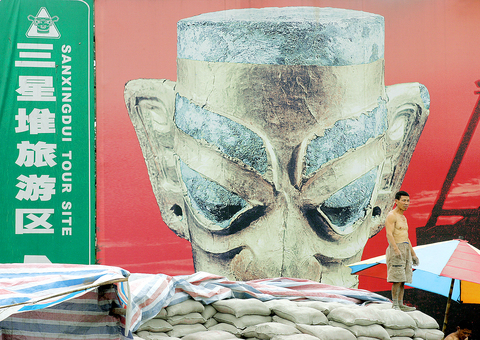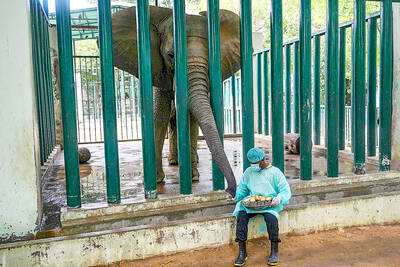Day after sweltering day on the banks of the Modi stream, archeologists are dealing shattering blows to traditional views of Chinese history as they work their way through the parched, yellow earth.
One of the world's great cities once flourished here at Jinsha village in China's southwest, the 1000BC equivalent of New York or Paris, and then inexplicably vanished, leaving no trace behind in the historical records.
Until recently, locals had no idea they were living on top of a great lost bronze-age civilization.

PHOTO: AFP
"Of course, people get excited when they hear that their home area has such a long history, such an advanced culture, and such refined art," said Jiang Zhanghua, deputy head of the Institute of Archeology in nearby Chengdu City.
The discovery of the site was entirely fortuitous, reflecting how much of the patchy record of the pre-historic past has come together merely by chance.
On a winter day in early 2001, excavation teams sent to the site by a property developer unearthed large numbers of ivory and jade artifacts that clearly suggested a major find.
If the company had decided to just carry on its work, covering the site in concrete as is believed by archeologists to be quite common, the Jinsha civilization might have been forgotten forever. But they called in authorities.
Weird masks
In and by themselves, the artifacts are striking in their weirdness -- masks with strangely protruding eyes, cult statues frozen in poses of unknown, but likely religious, significance.
More importantly, the spectacular discovery in Jinsha has added to the mass of evidence forcing historians to rethink Chinese history as a whole.
It is now clear that Chinese culture had multiple origins and did not, as previous generations of historians confidently believed, follow a simple path from just one single source.
It is a popular idea that the cradle of Chinese civilization is in the Yellow River valley about 1,000km northeast of Chengdu, and matured there before gradually spreading southward.
If nothing else, this traditional concept of history is supported by ancient myths about the Yellow Emperor and other early rulers, held dear by many Chinese.
But historians have long suspected this cannot be right. Ever since, that is, the discovery of the Sanxingdui civilization, about 50km from the Jinsha excavation site.
Here archeologists have been unearthing artifacts for most of the 20th century, discovering what now is confirmed as one of the world's major pre-historic civilizations.
The Sanxingdui culture, which blossomed from 5000BC to 3000BC, is characterized by the same radical strangeness as that unearthed at Jinsha.
Masks with oversized eyes and eyebrows, with some of them covered with gold leaf, are among its hallmarks.
But even as they display unique features, both Sanxingdui and Jinsha also show remarkable parallels with other ancient cultures.
Sacred sun and trees
"Sun worship was practiced here at the same time as it formed a central part of ancient Egyptian cults," says Zhu Yarong, a young historian at the large museum erected at Sanxingdui.
"People here appear to have worshipped sacred trees, just like in Mesopotamia, in modern-day Iraq," she says.
As the archeologists analyze the finds, they try to solve important questions, such as why the Sanxingdui site had a city wall while Jinsha did not.
The absence of a city wall in Jinsha is particularly strange, because cities in ancient China emerged as concentrations of political power, not trading centers as was mostly the case in the west.
Researchers also know little about the ties the Sanxingdui and Jinsha people had with other cultures, even if they can determine that exchanges must have been frequent.
The archeological teams have uncovered large numbers of ivory tusks originating from China's current border with mainland Southeast Asia.
The question is, how did they get here, and why?
Other questions remain. Where did the Sanxingdui and Jinsha people come from? Where did they go? And what exactly characterized their religion?
These are questions that may never be answered, because the Sanxingdui people left no written record. It is odd that people at their stage of development did not invent some type of writing system, but it is not unheard of.
Other civilizations, most notably in pre-Columbian America, were also illiterate, even as they were highly advanced in other fields such as architecture and astronomy.
Hidden knowledge
For Zhu, the museum historian, the discovery of written records would be a dream come true, unlocking hidden knowledge about how the mystical ancient inhabitants of the area lived and what their thoughts and feelings were.
"We don't know if they actually did invent writing. Maybe they did, but they used a material that has not survived to this day. It would be major, major step forward if we found written records," she says.

NO EXCUSES: Marcos said his administration was acting on voters’ demands, but an academic said the move was emotionally motivated after a poor midterm showing Philippine President Ferdinand Marcos Jr yesterday sought the resignation of all his Cabinet secretaries, in a move seen as an attempt to reset the political agenda and assert his authority over the second half of his single six-year term. The order came after the president’s allies failed to win a majority of Senate seats contested in the 12 polls on Monday last week, leaving Marcos facing a divided political and legislative landscape that could thwart his attempts to have an ally succeed him in 2028. “He’s talking to the people, trying to salvage whatever political capital he has left. I think it’s

Polish presidential candidates offered different visions of Poland and its relations with Ukraine in a televised debate ahead of next week’s run-off, which remains on a knife-edge. During a head-to-head debate lasting two hours, centrist Warsaw Mayor Rafal Trzaskowski, from Polish Prime Minister Donald Tusk’s governing pro-European coalition, faced the Eurosceptic historian Karol Nawrocki, backed by the right-wing populist Law and Justice party (PiS). The two candidates, who qualified for the second round after coming in the top two places in the first vote on Sunday last week, clashed over Poland’s relations with Ukraine, EU policy and the track records of their

UNSCHEDULED VISIT: ‘It’s a very bulky new neighbor, but it will soon go away,’ said Johan Helberg of the 135m container ship that run aground near his house A man in Norway awoke early on Thursday to discover a huge container ship had run aground a stone’s throw from his fjord-side house — and he had slept through the commotion. For an as-yet unknown reason, the 135m NCL Salten sailed up onto shore just meters from Johan Helberg’s house in a fjord near Trondheim in central Norway. Helberg only discovered the unexpected visitor when a panicked neighbor who had rung his doorbell repeatedly to no avail gave up and called him on the phone. “The doorbell rang at a time of day when I don’t like to open,” Helberg told television

A team of doctors and vets in Pakistan has developed a novel treatment for a pair of elephants with tuberculosis (TB) that involves feeding them at least 400 pills a day. The jumbo effort at the Karachi Safari Park involves administering the tablets — the same as those used to treat TB in humans — hidden inside food ranging from apples and bananas, to Pakistani sweets. The amount of medication is adjusted to account for the weight of the 4,000kg elephants. However, it has taken Madhubala and Malika several weeks to settle into the treatment after spitting out the first few doses they